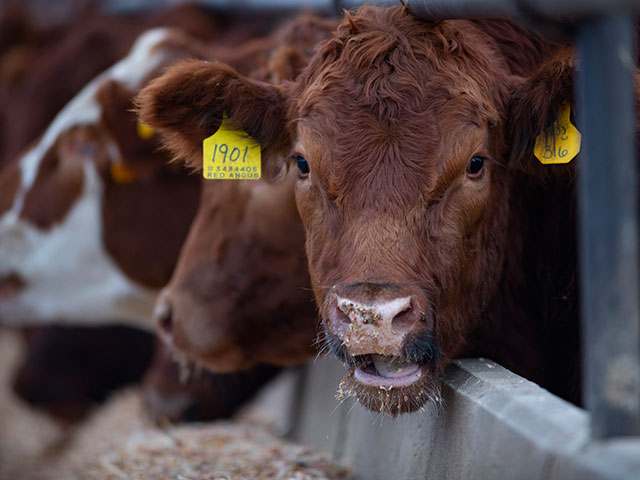Groups Want Brazil Beef Imports Stopped
US Cattle Groups: Can't Trust Brazil to Safeguard Beef Imports From BSE
LINCOLN, Neb. (DTN) -- U.S. cattle groups are united in pressing the Biden administration to stop beef imports from Brazil after the World Organization for Animal Health said Brazil (OIE) took more than eight weeks to report two confirmed cases of atypical bovine spongiform encephalopathy (BSE).
The OIE requires countries to report within 24 hours any animal disease event that could be of international concern for public health emergencies.
Most recently, Creutzfeldt-Jakob disease has been detected in two humans in Brazil. The CJD, according to Brazilian agricultural ministry officials, is sporadic in the cases and not caused by eating beef or beef byproducts.
Classic BSE has been linked to variant CJD in people. That version of BSE largely is caused by feed contaminated with the infectious prion agent, such as meat-and-bone meal containing protein derived from rendered, infected cattle.
On Sept. 4, Brazil confirmed two cases of atypical BSE in animals in meat-processing plants and not caused by contaminated feed.
The latest data from USDA showed fresh beef imports from Brazil totaled 33,631 metric tons (mt) for the week ended Nov. 6, 2021. At the same time last year that total was 19,447 mt. The Foreign Ag Service put the value of Brazilian beef imports this year through September at $526 million.
In separate letters to U.S. Agriculture Secretary Tom Vilsack the National Cattlemen's Beef Association and Ranchers-Cattlemen Action Legal Fund United Stockgrowers of America, or R-CALF USA, asked for the suspension of Brazilian beef imports until USDA can evaluate whether those imports are safe for U.S. cattle producers. In addition, the U.S. Cattlemen's Association wants those imports stopped as well.
Lia Biondo, director of policy outreach at USCA, told DTN Brazilian beef imports put the U.S. industry at risk.
"In 2017, we sounded the alarm on the increased reject rate on Brazilian beef imports and effectively lobbied the Trump administration to close our borders to Brazilian beef product for two years," she said.
"Brazil is a dishonest actor in the global marketplace and we cannot keep risking the health of the U.S. cattle herd to import beef from a country with a record like that."
P[L1] D[0x0] M[300x250] OOP[F] ADUNIT[] T[]
NCBA and R-CALF differ in their requests. NCBA asked for the suspension of fresh beef imports, while R-CALF wants all beef imports stopped.
"It's time to keep Brazilian fresh beef out of this country until USDA can confirm that Brazil meets the same consumer and food safety standards that we apply to all our trade partners," NCBA Vice President of Government Affairs Ethan Lane said in a statement.
"NCBA has long expressed concerns about Brazil's history of failing to report atypical BSE cases in a timely manner, a pattern that stretches back as far as 2012. Their poor track record and lack of transparency raises serious doubts about Brazil's ability to produce cattle and beef at an equivalent level of safety as American producers. If they cannot meet that bar, their product has no place here."
NCBA said in a news release that after the "market devastation of 2003" American cattle producers have "worked diligently to protect consumers and restore confidence both at home and abroad.
"Farmers and ranchers benefit greatly from the demand for beef that is built upon a commitment to integrity, transparency and the highest scientific standards," NCBA said.
"The consumer trust that our producers have worked so hard to build must not be jeopardized by any country that seeks to cut corners or conceal the truth about food safety concerns. Brazilian beef companies must prove that they are worthy of access to American consumers."
R-CALF is seeking an immediate suspension of imports of all beef products, both fresh and pre-cooked, pending a U.S. investigation into Brazil's food safety system and veterinary diagnostic laboratory system.
"This expanded request is based on our knowledge that the BSE prion is not inactivated by conventional beef-related heat processes," R-CALF said in the letter to Vilsack.
"Therefore, and because our request is chiefly driven by Brazil's repeated failures to timely report BSE outbreaks, all imports of all beef potentially subject to BSE contamination must be suspended. We first expressed our concern regarding Brazil's failure to timely report BSE outbreaks in our Dec. 10, 2012, letter to you."
R-CALF said in its letter Brazil's "trail of reporting violations reveals that government-led sanctions have not worked to change Brazil's practices." The group told Vilsack he should help pass the recently introduced mandatory country of origin labeling for beef bill in the Senate. R-CALF said the bill would provide a market-based approach to enforcement.
R-CALF told Vilsack it is concerned about Brazil's "repeated failures" in providing "timely notice" regarding BSE in 2012, 2014, 2019 and 2021.
Read more on DTN:
"US Questions Brazilian Beef Imports,"
"BSE Case in Alabama,"
"BSE Found in Florida Beef Cow,"
Todd Neeley can be reached at todd.neeley@dtn.com
Follow him on Twitter @DTNeeley
(c) Copyright 2021 DTN, LLC. All rights reserved.




